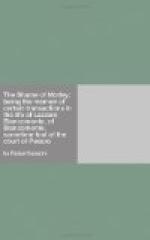“When that day comes I shall see to it that Boccadoro has his deserts. Meanwhile let the suggestion of my illustrious cousin be acted upon, and let this gifted poet be arrayed in a manner that shall sort better with the nobility of his mind that to-night he has revealed to us.”
Thus was it that I came, at last, to shed the motley and move among men garbed as themselves. And with my outward trappings I cast off, too, the name of Boccadoro, and I insisted upon being known again as Lazzaro Biancomonte.
But in so far as the Court of Pesaro was concerned, this new life upon which I was embarked was of little moment, for on the Tuesday that followed that first Sunday in October of such momentous memory, the Lord Giovanni’s Court passed out of being.
It came about with his flight to Bologna, accompanied by the Albanian captain and his men, as well as by several of the knights who had joined in Sunday’s fray. Ardently, as I came afterwards to learn, did he urge Madonna Paola and her brother to go with them, and I believe that the lady would have done his will in this had not the Lord Filippo opposed the step. He was no warrior himself, he swore—for it was a thing he made open boast of, affecting to despise all who followed the coarse trade of arms—and, as for his sister, it was not fitting that she should go with a fugitive party made up of a handful of knights and some fifty rough mercenaries, and be exposed to the hardships and perils that must be theirs. Not even when he was reminded that the advancing conqueror was Cesare Borgia did it affect him, for despite his shallow, mincing ways, and his paraded scorn of war and warriors, the Lord Filippo was stout enough at heart. He did not fear the Borgia, he answered serenely, and if he came, he would offer him such hospitality as lay within his power.
He came at last, did the mighty Cesare, although between his coming and Giovanni’s flight a full fortnight sped. As for myself, I spent the time at the Sforza Palace, whither the Lord Filippo had carried me as his guest, he being greatly taken with me and determined to become my patron. We had news of Giovanni, first from Bologna and later from Ravenna, whither he was fled. At first he talked of returning to Pesaro with three hundred men he hoped to have from the Marquis of Mantua. But probably this was no more than another piece of that big talk of his, meant to impress the sorrowing and repining Madonna Paola, who suffered more for him, maybe, than he suffered himself.
She would talk with me for hours together of the Lord Giovanni, of his mental gifts, and of his splendid courage and military address, and for all that my gorge rose with jealousy and with the force of this injustice to myself, I held my peace. Indeed, indeed, it was better so. For all that I was no longer Boccadoro the Fool, yet as Lazzaro Biancomonte, the poet, I was not so much better that I could indulge any mad aspirations of my own such as might have led me to betray the dastard who had arrayed his craven self in the peacock feathers of my achievements.




